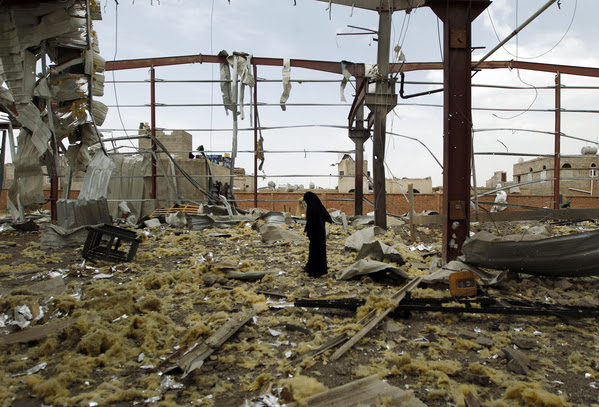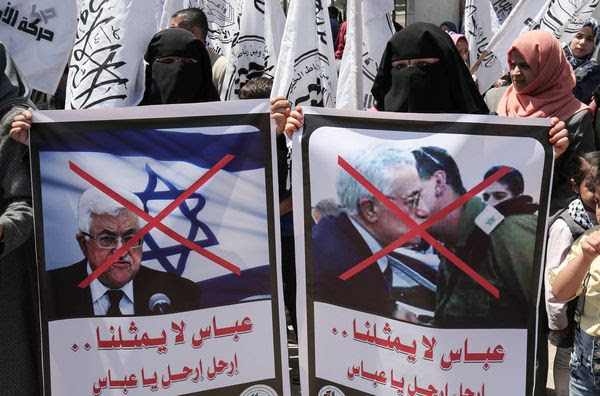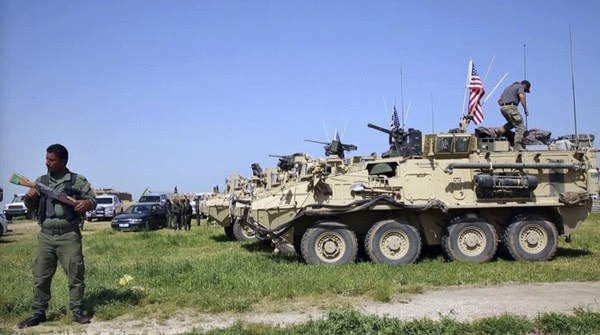|
Lund envisions “a kind of frozen, unholy half-life for Syria in the years ahead,” drawing a gloomy parallel to Burma before its recent liberalization: “You could easily end up with that kind of half-isolated, internationally detested, and not very well-functioning regime, struggling to tamp down peripheral insurgencies, while feeding off of humanitarian aid, smuggling, and the war economy as best it can.” • Iranian President Hassan Rouhani got a welcome boost on Wednesday when his reelection campaign got endorsed by a former Iranian president. From my colleagues: “Mohammad Khatami, a pro-reform leader who served two terms as president from 1997 to 2005, is under a domestic media ban, and the local press is prohibited from publishing his image or mentioning his name. But the former president announced on his website Tuesday that he would support Rouhani, who is also a moderate, for reelection on May 19. His endorsement could help mobilize turnout for the incumbent, who is facing tough competition as he struggles to defend his record on the economy and respond to questions about the benefits of a nuclear deal struck in 2015 with world powers, including the United States.” • Two big developments in Washington: House Republicans plan to vote on a controversial health-care bill this Thursday — the third effort since Trump came into office to repeal and replace the Affordable Care Act, or Obamacare. The flagging GOP effort to reshape the nation’s health care system picked up steam Wednesday as leaders tried to address concerns about people with preexisting medical conditions. But independent analysts remained skeptical that the new proposal would fully address the needs of at-risk patients who receive coverage guarantees under the Affordable Care Act. Separately, at a Senate hearing, FBI Director James B. Comey responded to Hillary Clinton’s accusations that his actions caused her to lose the election, saying he felt “mildly nauseous” at the thought of it. He gave his most exhaustive defense yet of his role in politically sensitive investigations, telling a Senate panel that, despite his feelings, he had no regrets regarding his decisions about a probe into Hillary Clinton's emails. |

A Yemeni woman inspects damage at a factory allegedly targeted by Saudi-led airstrikes in Sanaa, Yemen, in 2016. (Mohammed Huwais/Agence France-Presse via Getty Images)
Piling on
Two years of brutal civil war have left roughly 7 million Yemenis on the brink of starvation. Most of them are children — their eyes sunken, their breaths labored, too weak to fight heatstroke and disease. But the situation in Yemen is about to get even worse.
The Saudi military, which has been blockading the rebel-controlled port of Hodeida — the gateway for almost all the country’s food imports — dropped leaflets over the city warning of an “imminent offensive.” The United Nations and aid organizations working on the ground are warning that the attacks could trigger an all-out famine, the likes of which the world hasn’t seen in decades.
An offensive on the densely populated city, which has hundreds of thousands of residents, would likely result in widespread destruction and could finish off the port’s already-damaged infrastructure. There would be major bloodshed in Hodeida itself, but the effects would radiate into the countryside — controlled by the Shiite-led, Iran-backed rebels known as the Houthis — where many are living day-to-day on the humanitarian aid that passes through the port.
The Saudis, who lead a military coalition mostly made up of Sunni Persian Gulf states, are seeking to dislodge the Houthis from the wide swath of western Yemen they control and reinstate a friendly government. U.S. Defense Secretary Jim Mattis wants to scrap Obama-era restrictions on directly supporting the Saudi coalition, indicating that he believes military and intelligence assistance can break the current stalemate.
There's rising alarm in Congress at that prospect, especially since legislators have not been approached to authorize direct U.S. involvement in the war. U.S. military operations in Yemen are currently limited to targeted attacks against suspected al-Qaeda members. The U.S. also refuels Saudi jets and sells them billions of dollars of weaponry, which are no small things. Human rights activists accuse the Saudis of indiscriminate bombing in its campaign, saying the kingdom has killed thousands of civilians and reduced much of Yemen's vital infrastructure to rubble.
In a letter sent to Mattis on Tuesday, a bipartisan group threatened to introduce a bill that would “prohibit U.S. involvement in any such assault.” But even if they succeed, the Saudi offensive on Hodeida will likely go ahead — and politicians in Washington will have little effect on a catastrophe their country has played a major role in creating. — Max Bearak
Palestinian supporters of the Al-Ahrar movement hold posters reading "Abbas doesn't represent us" in Gaza City on April 29. (Said Khatib/Agence France-Presse via Getty Images)
The big question
Palestinian Authority President Mahmoud Abbas came to Washington on Wednesday for his first meeting with President Trump. It was another chance to push for the creation of a Palestinian state and be feted at the White House; Trump, a notable Israel hawk, said it was a "great honor" to host Abbas and said he hoped to help "facilitate" a final agreement between Abbas and Israel. But even as he enjoys Trump's hospitality, the aging Abbas is deeply unpopular at home, seen as ineffective and corrupt by many Palestinians. So we asked Post Jerusalem bureau chief William Booth: How fragile is Abbas’s position as de facto Palestinian leader?
"The quick answer is that Abbas, whom everyone calls by his nickname, Abu Mazen, is not very popular among Palestinians. Most recent polls have two-thirds of those surveyed wishing he would resign.
"In the barbershops and hair salons of Nablus and Bethlehem, Palestinians in the West Bank will complain all day long about Abu Mazen and his cronies. They haven’t gotten the Palestinians a state and, worse for many, the regime looks tired and smells corrupt."Nor is it clear just how many Palestinians Abbas really represents. Gaza is run by Hamas hardliners and their militia, branded a terror organization. The West Bank is run by 82-year-old Abu Mazen and Fatah. There’s no zest, no youth, no next generation. "But while Abbas may not be well-liked, he’s still The Man.
"He was last elected more than a decade ago — his term ended in 2009 — yet he still runs the Palestinian Authority. Just months ago, in December, he reasserted control of his Fatah party by weed-whacking the competition at a party congress and keeping his geriatric allies firmly in control. Abbas is also head of the Palestine Liberation Organization, and the PLO is the sole negotiating body in peace talks with Israel.
"His nearest competitors aren't in much position to challenge him, either: Hamas is having its own problems governing Gaza; former Yasser Arafat aide Mohammed Dahlan lives in exile; and Marwan Barghouti, while popular, languishes on a hunger strike in an Israeli prison while serving multiple life sentences for the murder of Israelis.
"So if anyone represents the Palestinian people in Washington and the world, it is Mahmoud Abbas, warts and all. And that isn't likely to change any time soon."
|







No comments:
Post a Comment